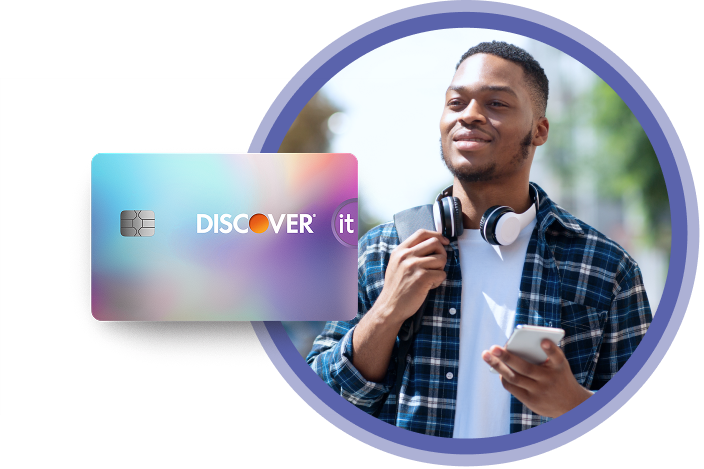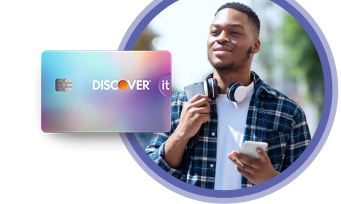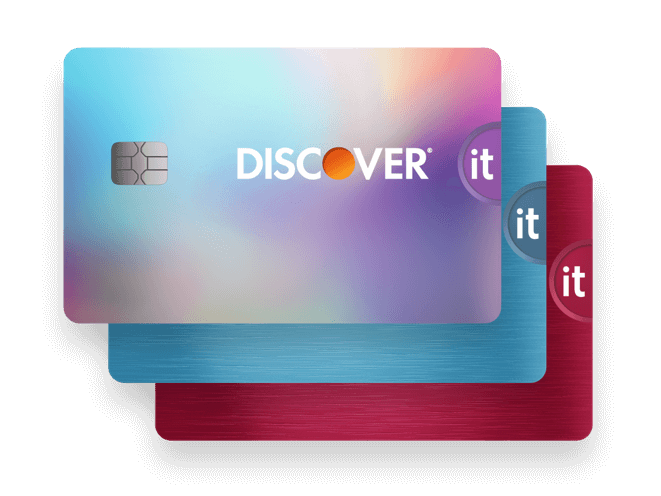Intro APR Offer
x% intro APR† for x months on purchases.
Action required: Update your browser
We noticed that you're using an old version of your internet browser to access this page. To protect your account security, you must update your browser as soon as possible. You'll be unable to log in to Discover.com in the future if your browser has not been updated. Learn more in the Discover Help Center


Unlimited Cashback Match
Get an unlimited dollar-for-dollar match of all the cash back you earn at the end of your first year, automatically. There is no limit to how much we'll match.3
Earn 5% cash back on everyday purchases at different places you shop each quarter, up to the quarterly maximum when you activate.
Plus, earn 1% cash back on all other purchases.
Intro APR Offer
x% intro APR† for x months on purchases.
Then x% to x% Standard Variable Purchase APR will apply.
Intro APR Offer
x% intro APR† for x months on purchases.
Then x% to x% Standard Variable Purchase APR will apply.
Unlimited Cashback Match
Get an unlimited dollar-for-dollar match of all the cash back you earn at the end of your first year, automatically. There is no limit to how much we'll match.3
Earn 2% Cashback Bonus® at Gas Stations and Restaurants on up to $1,000 in combined purchases each quarter, automatically.2
Plus, earn unlimited 1% cash back on all other purchases.
x% intro APR† for x months on purchases.
Then x% to x% Standard Variable Purchase APR will apply.
x% intro APR† for x months on purchases.
Then x% to x% Standard Variable Purchase APR will apply.
Earn 5% cash back on everyday purchases at different places you shop each quarter like grocery stores, restaurants, gas stations, and more, up to the quarterly maximum when you activate. Plus, earn unlimited 1% cash back on all other purchases – automatically.
Earn a 2% Cashback Bonus® at Gas Stations and Restaurants on up to $1,000 in combined purchases each quarter, automatically. Plus, earn unlimited 1% cash back on all other purchases.2
Get an unlimited dollar-for-dollar match of all the cash back you earn at the end of your first year, automatically. There is no limit to how much we’ll match.3
Get an unlimited dollar-for-dollar match of all the cash back you earn at the end of your first year, automatically. There is no limit to how much we’ll match.3
$0
$0
There’s a x% Introductory APR for your first x months. After that, an x% to x% Standard Variable Purchase APR will apply.
There’s a x% Introductory APR for your first x months. After that, an x% to x% Standard Variable Purchase APR will apply.
There’s a x% Intro APR for x months from the date of first transfer with a x% transfer fee, for transfers under this offer that post to your account by x. Learn more about how to do a balance transfer.
After the intro APR expires, your APR will be x% to x% based on your creditworthiness. This APR will vary with the market based on the Prime Rate.
There’s a x% Intro APR for x months from the date of first transfer with a x% transfer fee, for transfers under this offer that post to your account by x. Learn more about how to do a balance transfer.
After the intro APR expires, your APR will be x% to x% based on your creditworthiness. This APR will vary with the market based on the Prime Rate.
We’re giving away a $5,000 scholarship every month. No essay, no GPA requirement.13
NO PURCHASE NECESSARY. See Official Rules for sweepstakes eligibility and entry requirements, entry deadlines and drawing dates, details including odds, list of eligible colleges and universities, prize descriptions and an alternate method of entry.13
Different student credit cards offer different initial credit limits, which depend on factors like:
Your income
Your credit score
How much credit you’re already using (known as “credit utilization”), if applicable
There is no set credit limit as everyone's situation is different. The minimum credit line for Discover student cards is $500.
You will often find introductory offers for 0% APR student credit cards, but these are offers for a limited period of time. After your introductory period, the standard APR will apply to any balance remaining on your card and any new purchases. This is why it’s important to look at the standard APR when you compare credit cards.
Generous student rewards: Whether you choose the Discover it® Student Cash Back Card or Discover it® Student Chrome Card, you earn cash back on all your purchases.
Only Discover automatically gives unlimited Cashback Match to all new cardmembers: we’ll match all the cash back you’ve earned at the end of your first year.3 You could turn $10 cash back to $20. You could turn $50 cash back to $100. You could turn $100 cash back to $200.
Redeem cash back for any amount.9 Rewards don't expire for the life of your account.9 And $1 cash back = $1 to redeem.9
No Annual Fee: Keep more in your pocket with no annual fee. So, you have more money to spend where it matters.
Low introductory APR: Enjoy our low intro APR offers for new cardmembers so you can save on interest.
Use it where you love to shop: Discover is accepted nationwide by 99% of places that take credit cards.5
Manage your account on the go: Check your balance, make payments, view your transaction history, redeem your rewards, and more on the free Discover app or website.
FICO® Score and more: It's free and checking your score doesn't hurt your credit.1
Customizable card designs: Let your personality shine with a custom card that’s uniquely you. Choose from a gallery of colorful card designs when you apply to become a Discover it® cardmember.
24/7 Customer Service: Need help or have questions? Customer service is available any time, day or night.10
Email and Text Alerts: You can enable email and text alerts to make it easy to keep tabs on your account. Activate alerts for things like payment due dates or spending limits and we’ll send you notifications to your phone or email.
Fast, secure mobile login: Discover mobile app users can log in with Touch ID or your 4-digit passcode to see your balance, FICO® Credit Score, and more. Or, check your account without logging in using Quick View.
Learn more about Discover Mobile for iPhone and Android.
$0 Fraud Liability Guarantee: You’re never held responsible for unauthorized purchases on your Discover Card.7
Free Social Security number alerts: Get an alert if we find your Social Security number on the dark web.11 Sign up to activate this free benefit.
Account control at your fingertips: Lost Discover card? Freeze your account in seconds with an on/off switch either on the mobile app or website to prevent new purchases and cash advances.12
As a college student, you may have little or no credit history, so the best credit cards for you will be geared toward students in your situation. A rewards student credit card, such as Discover it® Student Cash Back Card or Discover it® Chrome for Students, can help you earn cash back on everyday purchases.
Discover reports your credit card account activity to the three major credit bureaus, so you start to develop a record of your financial activity. That’s why Discover student credit cards can help you build your credit history with responsible use.4 (Plus, you earn cash back rewards on every purchase.)
It can be a simple process to start building credit with responsible use.4 To build your credit responsibly with a student credit card:
• Make all payments on time.
• Pay your balance in full each month (or, if you can’t, at least pay more than your minimum due each month).
• Avoid carrying a balance: you’ll have to pay interest on any purchases or amounts you don’t pay off each month.
Things like late payments, failing to pay at all, or other negative activity with your student credit card or other loans in your name could hurt your ability to build credit.
When you apply online, here are some of the things you will need when applying online.
You need to be at least 18 to apply for a student credit card and meet the income requirements for your age, but there's no credit score required to apply for a Discover student credit card.*
Discover student credit cards can help you build your credit history with responsible use4 and earn cash back rewards on every purchase.
Regular credit cards are typically designed for people with an established credit history. These differ from student credit cards, which are designed with students in mind who may have little to no credit and are enrolled in school. It’s common for student credit cards to have a lower credit limit, so students can get started using credit and build credit with responsible use.4
Feel like you're ready to take on more credit? You can apply by requesting an increase online or you can call us at 1-800-DISCOVER.
When you graduate, call us to update your personal information, such as your income, housing, e-mail, and address. Updating this information may make you eligible for credit line increases.
No credit score is required to apply for a Discover it® Student credit card.* The Discover it® Student credit card can help you build credit with responsible use.4
Although you might need a new student credit card for a number of reasons, simply replacing your credit card if it is lost or stolen won’t affect your credit score. Also, you’re never held responsible for unauthorized purchases on your Discover Card.8
See if you’re pre-approved with no harm to your credit score.8
Learn how to get your first credit card, including what card to apply for and what information you will need to get approved.
If you’re in school and considering a credit card for students, you probably have a lot of questions. This article will cover everything you need to know about student credit cards.
The key to happy card membership is to know what you’re doing from the start. Here are five tips for the first-time credit card holder.





